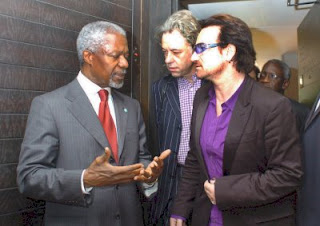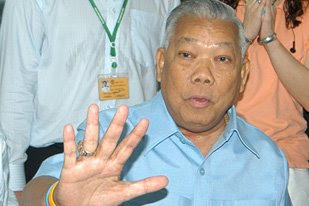
The headlines have made the situation clear: 'Benazir Bhutto's Widower takes power in Pakistan'. Though this is demonstrative of the extent to which Asif Ali Zardari lives in his deceased wife's shadow, it also goes a long way towards explaining why he holds the reins of power now.
We were expected to mourn Benazir Bhutto, the putative counterpoint to the dictatorial Musharraf, the beacon stubbornly advocating democracy and
free cosmetics for a nation beleaguered by military rule and
inappropriate use of foundation. And similarly, we are expected to celebrate the ascent to power of her husband, to whom she presumably passed the torch of mending Pakistan's spirit and restoring its devotion to democracy. Unfortunately, that's all bullshit.
Doing some cursory research on Bhutto, her husband, and the party they run, reveals more fingers in pies than some sick, freakish Dusseldorf-produced finger-pie fetish porn. The Pakistan People's Party, founded in 2002, has been an unabashed vehicle for the promotion of one family: the Bhuttos. Indeed, the leadership of the party has always belonged to the Bhuttos, even after the assassination of Benazir Bhutto, when the party briefly passed to her adolescent son. This is not a party which is founded on the principles of meritocratic democracy. It is a clear successor to the politics of patronage dominated by a few prominent elite families.
Though the New York Times now strenously denies it, both Benazir Bhutto and Asif Ali Zardari were
tried and found guilty of corruption involving gross abuses of power regarding kickbacks received from Polish tractor producers and French military manufacturers. The Bhuttos were sentenced in both Pakistan and Switzerland, with evidence from Polish, Swiss and French authorities. Their assets include a £6.35 million neo-Tudor(sometimes referred to as
'tudorbethan' by art historians, gangsters and pimps) house in Surrey, and undisclosed millions of dollars in Swiss and Dubai banks. Zardari has no governing experience to speak of. This is not democracy as we should know it.
The fact is, though, that Zardari was elected, easily defeating his closest rival, the fantastically named Saeeduzzaman Siddiqui. This is the man the Pakistani people see fit to govern them. And this is the problem. Endemic to most developing states, including many in Africa and Southeast Asia, is the chieftain culture that tolerates and expects elected officials to almost immediately become some of the wealthiest people in the country. Whereas in the West, theoretically at least, elected representatives are expected to adhere to the ethic of service and responsibility, the political culture in countries new to democracy is still redolent of autocracy, and rulership.
It was an election. It did replace a military dictator. But the election of a man who escaped two corruption convictions on the back of his wife's reputation, who leads an openly dynastic 'political party', who still possesses fantastic ill-gotten wealth in Swiss bank accounts (an
amnesty was declared for the corruption charges) but claims to be a socialist, is not the kind of election anyone in the international community should promote, and not one anyone in Pakistan should be happy with.





















